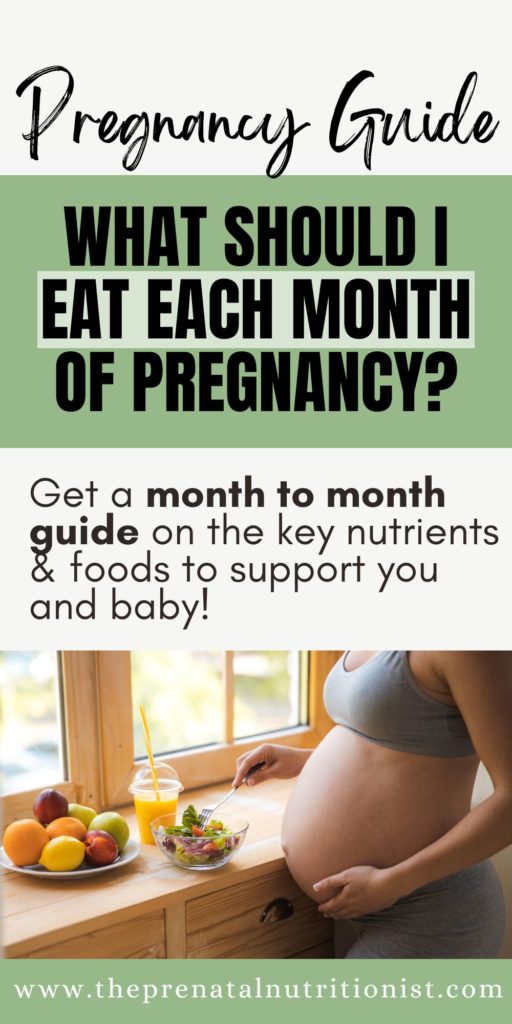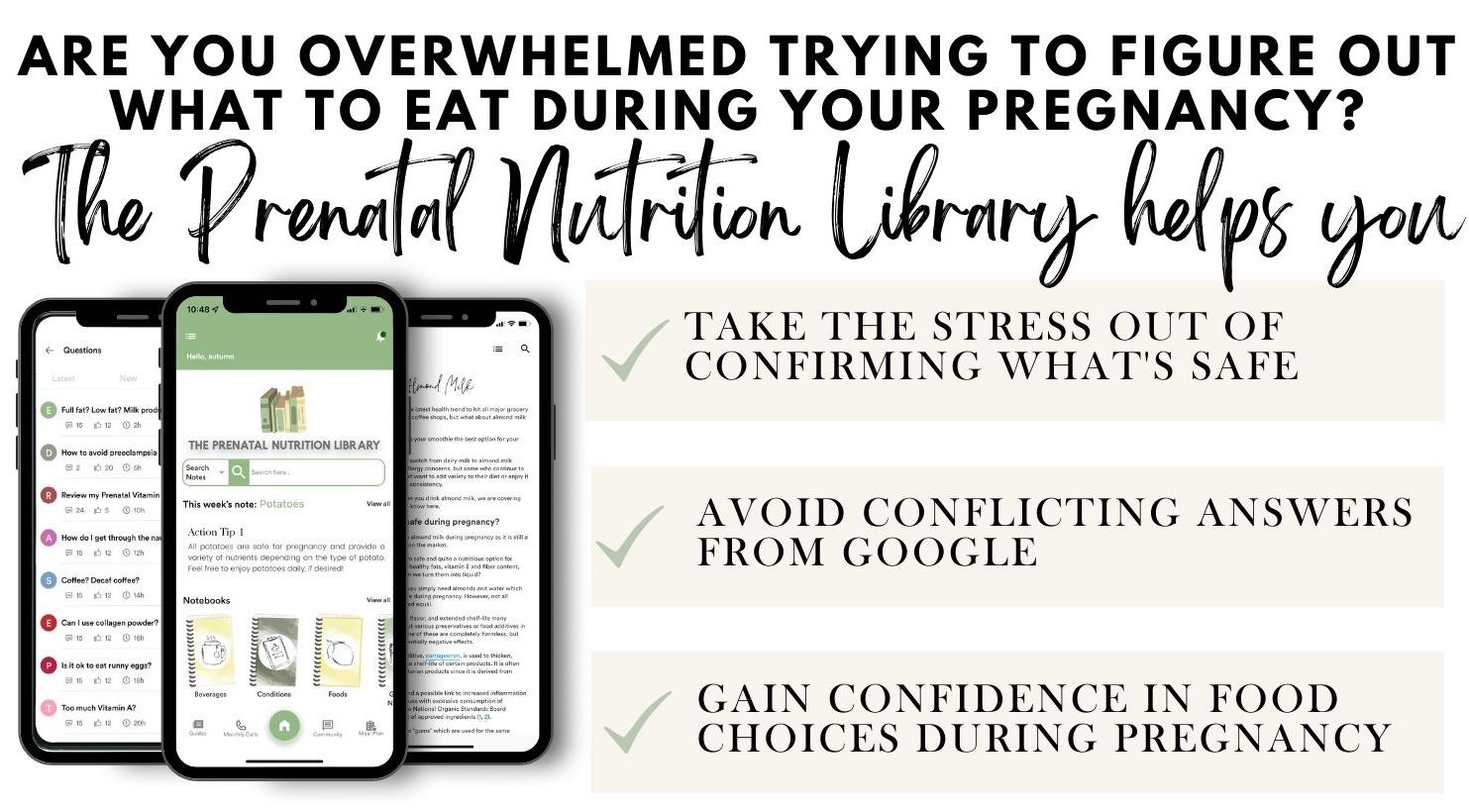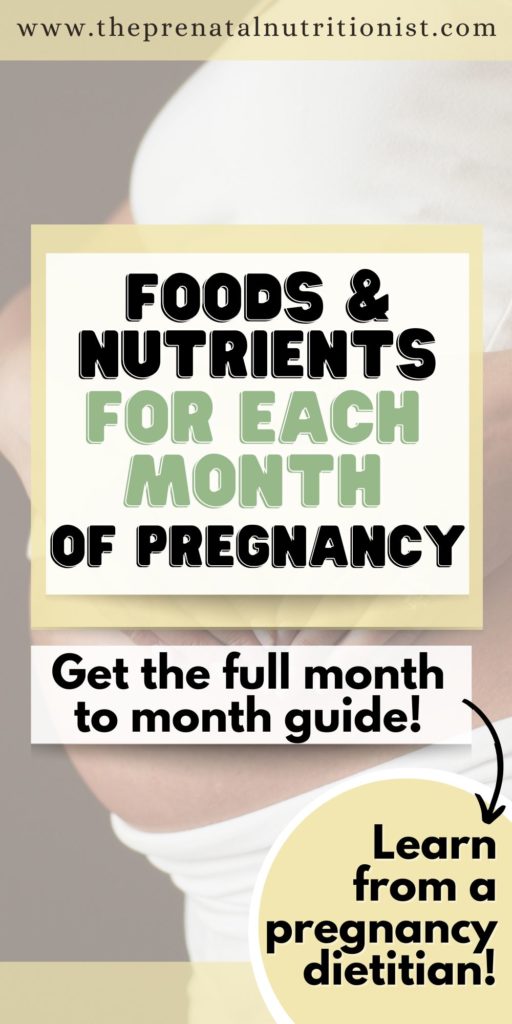
Growing a baby in your womb can be a roller coaster. One minute, you’re just cruising along, living your life, and the next thing you know, a tiny little human is taking up residence in your uterus. It’s magical, mind-blowing, and truly miraculous!
But along with all the morning sickness, kicks, and “is that a foot or an elbow?” moments, food and nutrition during pregnancy are on almost everyone’s mind. One week, you can’t get enough pickles and ice cream. Then, the mere thought of that combo makes your stomach do somersaults!
What you’re putting into your mouth during this time isn’t just fueling you. It’s literally building the foundations for your little baby! I’m talking about supplying all the raw materials to develop their tiny organs from scratch and the nutrients to build their brains. Correcting deficiencies and meeting nutrient needs will support baby development and help curb common pregnancy symptoms like headaches, leg cramps, and constipation.
That’s why having a solid pregnancy diet plan is crucial. Make sure you two get all the vitamins, minerals, macros, and other good things you need as you travel through this wild ride. Please note: while some nutrients have well-known roles in particular stages of pregnancy, incorporating enough of all nutrients throughout pregnancy is most important. The best strategy is to focus on a well-balanced diet throughout pregnancy as best as possible!
The other part is that there are no blanket statements because everyone’s needs will differ. For example, if someone is deficient in vitamin D, iron, or other nutrients, that will be a priority! Or, if someone has food allergies or follows a particular dietary pattern that includes restrictions, like a vegetarian diet, there may be other priorities and key nutrients to focus on!
With that in mind, whether you’ve just stepped onto this wild ride into motherhood or already a few months deep, today’s topic is a must-read. Trust me, this is information you’ll want to wrap your head around for you and that little tenant’s sake!
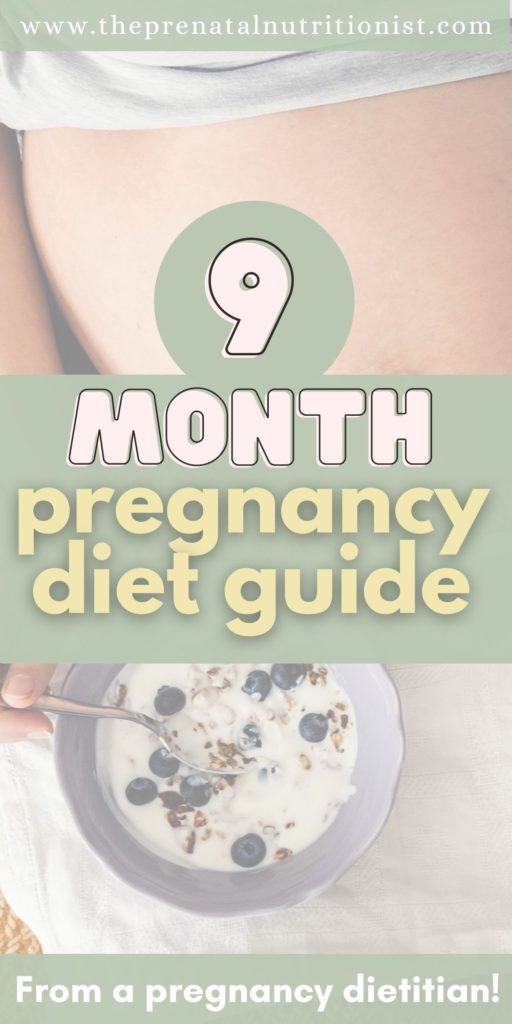
Pregnancy Diet Chart Month by Month
Did you know a pregnant person’s need for several nutrients increases during pregnancy? Yes, it’s true! All these nutrients support you and your baby’s growth and development from preconception through delivery!
This pregnancy diet chart isn’t just some random list of foods. It’s a list of important nutrients of focus for pregnancy that you and your baby need to thrive! While we highlight some of the reasons a particular nutrient is important during a month of pregnancy, all the nutrients reviewed here are important throughout your pregnancy. The priority will always be to focus on a well-rounded and varied diet with plenty of whole-food choices!
Here’s the science-backed review of important nutrients from month to month during pregnancy:
1st Month
You’re just jumping into this wild ride, and your body is already working hard! In the first month of pregnancy, your nutritional needs might not be worlds away from your pre-pregnancy diet just yet, but there are definitely a few key first-trimester foods to include in your shopping list that include the nutrients below:
- Folate: This B vitamin is an absolute must during these early stages. It helps prevent neural tube defects in your baby’s developing brain and spinal cord. Load up on leafy vegetables, citrus fruits, beans, and strawberries to score your daily 600 mcg DFE folate recommended dietary intake per day.
- Iron: With your blood volume increasing to keep up with the baby, your body needs more iron to produce enough oxygen-carrying red blood cells for both of you. It’s time to stack your plate with iron-rich foods like beef, liver, chicken, and cooked oysters.
- Calcium: Those tiny bones are starting to form, so you must meet calcium goals. Dairy products like milk, Greek yogurt, and cheese are excellent sources, but leafy greens, tofu, and chia seeds help boost non-dairy calcium, too.
Drink plenty of water to stay hydrated, and remember your prenatal vitamins to fill in any nutritional gaps!
2nd Month
As you enter the second month, your little baby’s brain and neural systems are developing rapidly. It’s crunch time to provide all the right nutrients to support this crucial growth spurt:
- Choline: This essential nutrient is key for your baby’s brain and neural tube development. To get your daily choline fix, I recommend including eggs in your diet daily (don’t leave out the yolks)!
- Omega-3s: These fats play a vital role in helping your baby’s brain and eyes develop properly. Add salmon, sardines, anchovies, and other omega-3-rich fish to your rotation if you can. If you’re not a fish fan or are experiencing an aversion, talk to your provider and consider a high-quality omega-3 supplement.
- Protein: Your body’s working overtime to grow that baby, so you must increase your protein intake. Meats, poultry, fish, eggs, lentils, nuts, and seeds are all excellent protein-packed options.
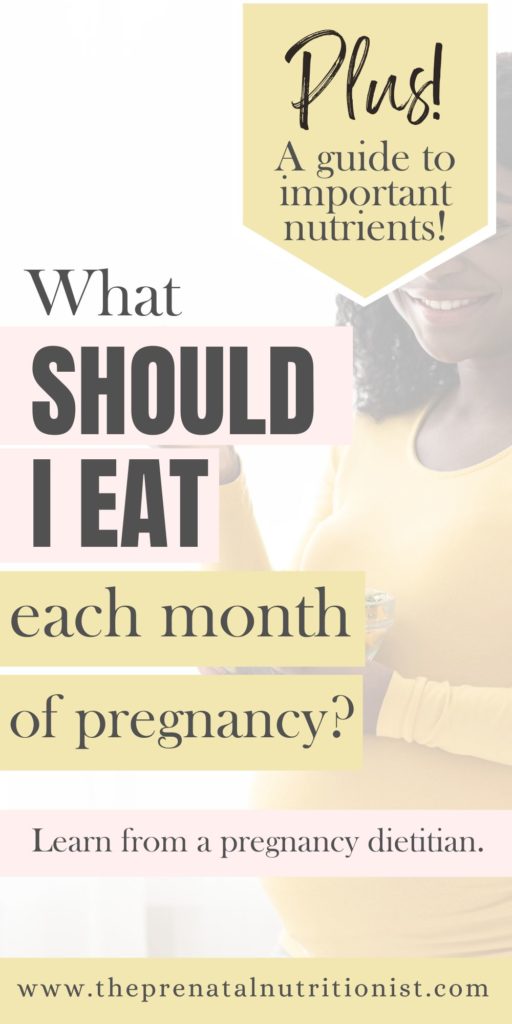
3rd Month
You’ve hit that third-month milestone, and your little baby’s organ systems are developing rapidly. These nutrients, and many others, are crucial to support mom’s health and baby’s growth ahead:
- Zinc: This powerful mineral is essential for cell growth and division, as well as helping build your baby’s immune system from the ground up. Load your plate with zinc-rich foods like beef, poultry, well-cooked seafood, beans, and fortified cereals.
- Vitamin C: This powerful antioxidant that supports your little one’s bone and tissue development because it is essential for the synthesis of collagen. This vitamin also gives your iron absorption a helpful boost. It’s time to stock up on citrus fruits, bell peppers, broccoli, and strawberries!
- Fiber: With that baby growing, digestive issues like constipation can rear their ugly heads at any point during pregnancy. Increase your fiber with ground flaxseeds, whole grains, avocado, fruits, veggies, and plenty of fluids to keep things moving smoothly.
4th Month
This is when your little nugget’s growth really starts kicking into high gear. As your baby’s development speeds up, some people notice appetite and hunger begin to pick up during this stage.
- Protein: With those tiny muscles and bones forming, you’ll need to keep that steady protein intake strong. Protein needs gradually increase throughout pregnancy. Load up on meats, poultry, fish, eggs, legumes, and dairy.
- Folate: This B vitamin is still an absolute must. Folate remains important throughout pregnancy. Not just in the first trimester. It plays a critical role in DNA synthesis and cell division. Folate is also needed for red blood cell formation.
- Iron: Your ever-increasing blood volume means you must maintain your iron intake to produce enough oxygen-carrying red blood cells for both of you. Beef, liver, and seafood are great places to get iron!
5th Month
You’re hitting that fifth-month stride, and your body is working overtime to support this rapid development phase, so here’s what you’ll want on your nutritional radar:
- Calcium: A steady calcium supply is essential for forming tiny bones and teeth. Include dairy like milk, Greek yogurt, and cheese a few times daily. Leafy vegetables, tofu, and chia seeds provide some plant-based calcium.
- Vitamin K2: Vitamin K is a group of fat-soluble nutrients, including vitamin K1 (phylloquinone) and vitamin K2 (menaquinone). Vitamin K2 plays a more significant role in heart and bone health and is essential in activating calcium for use in our bodies. Vitamin K2 works alongside vitamin D, calcium, and vitamin A for many functions. You will find vitamin K1 in plant foods like leafy greens and vitamin K2 in animal foods like beef and dairy.
- Omega-3s: These brain-boosting, healthy fats are still vital to your nugget’s neural and eye development. Work salmon, sardines, and anchovies into your weekly meal routine, or seriously consider a high-quality omega-3 supplement!
6th Month
As your baby’s growth kicks into high gear, your nutritional demands continue to be heightened.
- Zinc: This mineral is still essential for supporting cell growth and division. Plus, it’s needed for your baby’s immune system. Keep loading on zinc-rich beef, poultry, well-cooked seafood, and beans.
- Vitamin C: This powerful antioxidant promotes bone and tissue development in your growing baby and improves non-heme iron absorption. Keep citrus fruits, bell peppers, broccoli, and strawberries on rotation!
- Fiber: Eating enough fiber is a good place to start to keep you feeling “regular.” Whole grains, fruits, veggies, and lots of fluids are key to keeping things moving smoothly. Magnesium can also be helpful when paying attention!
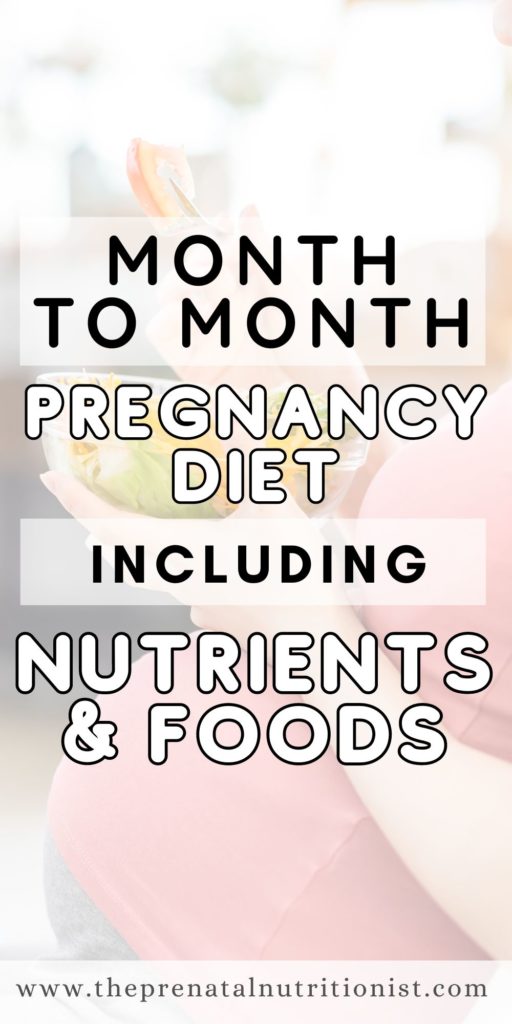
7th Month
You’ve entered the final trimester! You’re nearing the finish line, and it’s time to start preparing your body. Here’s what you’ll want to keep on your radar:
- Protein: Your needs for protein continue to grow, so you’ll need to maintain a steady intake of high-quality protein. For high-quality protein, make meats, poultry, fish, eggs, legumes, and pasteurized dairy staples.
- Iron: Iron-rich foods are still necessary for a baby’s development and the nearing delivery date. Besides meat and seafood, spinach and lentils are plant-based sources of iron that provide a boost. Be sure to use vitamin C foods to enhance absorption.
- Magnesium: Many people under-consume this nutrient, which plays a key role in many body functions and reactions. Eating plenty of magnesium-rich foods can also help curb common pregnancy symptoms like insomnia, headaches, and leg cramps. Start including more avocado, black beans, and spinach in your diet!
With your little baby taking up more and more space, you may need to start eating smaller, more frequent meals to avoid discomfort and ensure you’re getting all the nutrients you need. Experiment with what works best for you!
8th Month
You’re in the final countdown! As that due date draws near, your body’s working overtime to support your baby’s last big growth leaps. Time to double down on these nutrients:
- Vitamin A: Vitamin A is important for several key developments in your baby, such as the eyes, arms, legs, heart, and immune system. It also helps maintain your tissues, vision, and immune system. Like vitamin K2, you need two types of vitamin A: preformed and pro-vitamin A. You might have heard of beta-carotene, which is pro-vitamin A and found in plant foods like sweet potatoes. But, we also need to eat preformed vitamin A in foods like eggs and yogurt.
- Vitamin D: This vitamin is important for calcium absorption and utilization to support optimal bone development. Get your D from fatty fish, egg yolks, and some types of mushrooms, or consider a supplement if your levels are low.
- Omega-3s: These brain-nourishing, healthy fats are still crucial. Adequate omega-3 intake may also help reduce the risk of postpartum depression. Salmon, sardines, anchovies, or a high-quality supplement should stay in rotation.
9th Month
You’ve made it to the final month; congratulations! As you prepare for that grand finale of meeting your little one face-to-face, here’s what you’ll want to focus on nourishing your body with:
- Fiber: As your growing baby puts more pressure on your digestive system, keeping that fiber game strong is one key to preventing or managing constipation. Your BFFs will be beans, avocados, fruits, veggies, and fluids.
- Hydration: Staying super hydrated during these final weeks is absolutely crucial. You would likely benefit from a daily mineral mocktail or electrolyte powder (code RYANN). We have recipes inside The Prenatal Nutrition Library App. Fluid needs are individual, but around 100 oz daily is a good place to start.
- Energy-Boosting Foods: You’re about to take on the marathon of all marathons with labor, so you’ll want to fuel that machine with nutrient-dense, energy-rich foods. Think fiber-packed whole grains, colorful produce, proteins, and fats. Anything that’ll give you that extra stamina you’ll need.
Your journey into motherhood is already well underway, and by eating right, you’re giving your baby the best possible start in life.
This whole “pregnancy diet” thing isn’t about torturing yourself with some miserable list of restricted foods or following a bunch of rigid rules to a T. It’s about treating your hard-working body to all the good stuff it needs to thrive over the next nine (ish) months.
But I hear you—making smart, nutritious food choices when you’re nourishing for two can sometimes feel like a serious headache. So much contradictory advice and outdated tips are thrown your way from well-meaning friends, relatives, and that know-it-all co-worker.
That’s why having an evidence-based resource like The Prenatal Nutrition Library (TPNL) on your team is crucial. We’ll help you cut through all the noise by giving you real guidance from experienced pregnancy dietitians you can trust!
It gets better—we’ll also hook you up with legit meal plans packed with all the right nutrients for you and your little one. The meal plans are designed for each trimester and are easy to make! You’ll get delicious recipes and confidently meet your nutrient needs for two.
Ready to try a sample first? Do yourself a favor and download our Free 1-Week Sample Meal Plan. It’s just a little taste of how satisfying and energizing your pregnancy diet can be with some trustworthy resources in your corner.



